Daughter Urgently Appeals: Save Father On Iran Death Row

The daughter of German-Iranian Jamshid Sharmahd, who is currently on death row in Iran, pleaded for the United States and Germany to intervene in his case.

The daughter of German-Iranian Jamshid Sharmahd, who is currently on death row in Iran, pleaded for the United States and Germany to intervene in his case.
This appeal comes in the wake of a recent deal by President Joe Biden's administration, which secured the release of five American citizens incarcerated in Iran.
Sharmahd, 68, a software developer and long-term resident of California, was reportedly abducted during a visit to the United Arab Emirates in 2020 and subsequently transported to Iran against his will. The Iranian judiciary sentenced him to death on charges of "spreading corruption on Earth," a verdict that was upheld by Iran's Supreme Court in April. The family has vehemently rebuffed the allegations and Amnesty International has already condemned his trial as a sham.
Gazelle Sharmahd said she was frustrated by the passing of responsibility between Germany and the US. "It seems like a game of responsibility ping-pong. The issue is tossed back and forth, with each side claiming 'not my citizen,' 'not my jurisdiction.' And we're not getting through to them," she said
Germany has said it is actively involved in the case through its highest channels but Gazelle Sharmahd is convinced that Germany's efforts were only on improving her father's prison conditions.
While denouncing Iran's treatment of Sharmahd as "reprehensible," the US State Department said that that the case falls within Germany's purview as he is their citizen.
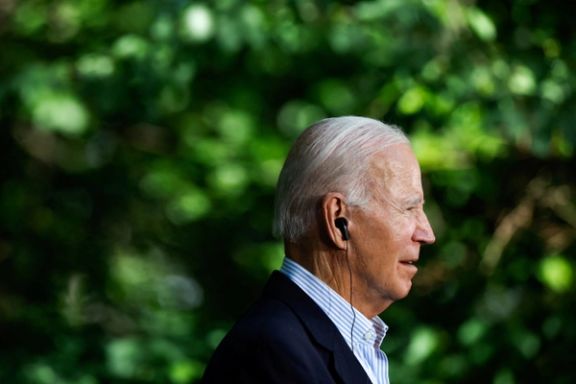
President Joe Biden is facing increasing backlash as Congress demands answers as to how the latest nuclear talks with Iran short-cut strict US laws.
House Majority Leader Steve Scalise, GOP Conference Chair Elise Stefanik and House Foreign Affairs Committee Chairman Michael McCaul have written to Biden accusing him of breaking a 2015 law by negotiating a secret nuclear “understanding” with Iran and hiding it from Congress.
Any negotiations and agreements with Iran must go through the Iran Nuclear Agreement Review Act, which clearly states that within five days after reaching any agreement with Iran regarding Iran's nuclear program, the President must relay to Congress several issues for approval.
These include “the text of the agreement and all related materials and annexes; a related verification assessment report of the Secretary of State; a certification that the agreement includes the appropriate terms, conditions, and duration of the agreement's requirements concerning Iran's nuclear activities, and provisions describing any sanctions to be waived, suspended, or otherwise reduced by the United States and any other nation or entity, including the United Nations”.
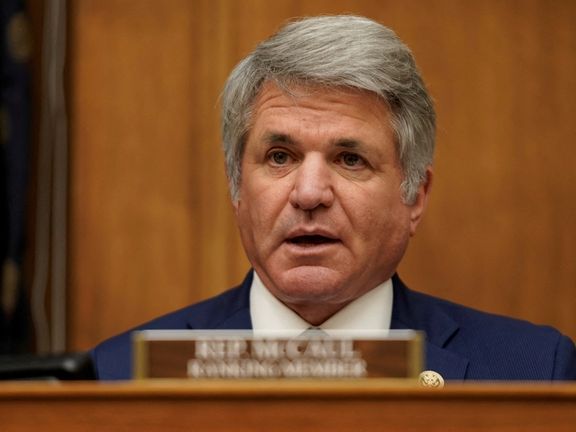
The three Republicans wrote to Biden of their “significant concern” that the administration is pursuing a nuclear understanding with Iran alongside a hostage release deal. Earlier this month, five dual US-Iranian citizens held in Iran were released in return for the unfreezing of $6bn of Iranian funds in South Korea, a move which experts said only compound Iran’s policy of hostage taking for gaining leverage against the West.
The letter, dated August 21, stated “any such deal or understanding with Iran that does not permanently and completely halt Iran’s nuclear enrichment raises concerns that your Administration is entrenching an Iranian nuclear program that threatens US national security”, detailing the rapidly increasing levels of uranium enrichment revealed this year.
“Reducing the rate at which Iran is stockpiling 60% enriched uranium does not significantly change this threat, particularly as Iran continues to install advanced centrifuges,” the trio said, reiterating Iran’s cessation to comply with the JCPOA nuclear agreement and its continued refusal to fully cooperate with an ongoing International Atomic Energy Agency (IAEA) investigation.
Referring to last week’s deal, the group stressed that the hostage-taking policy of the regime, which has been going on for years, is the Iranian Republic’s “negotiating tactic and funding mechanism”, all of which puts US security and the security of its citizens at greater risk.
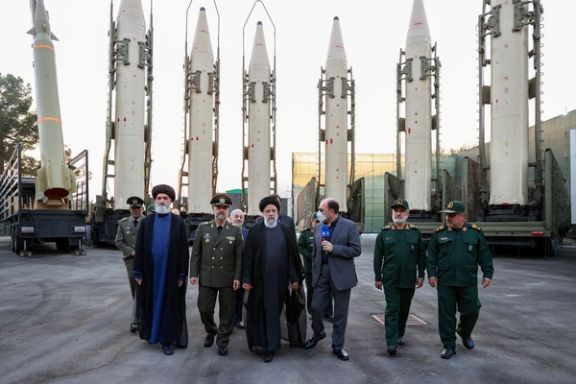
Just last week, Richard Goldberg, a senior adviser at the Foundation for Defense of Democracies and former White House National Security Council director for countering Iranian weapons of mass destruction, raised the matter of Biden’s skirting the legal obligations. “Emergency hearings cannot be held. Resolutions of disapproval cannot be fast-tracked. President Biden has successfully evaded the Iran Nuclear Agreement Review Act, which requires him to notify Congress of any agreement with Iran related to its nuclear program before lifting sanctions,” he said.
The Republicans warned Biden that if “the Administration continue to ignore US law and flout congressional oversight, we will use all the tools at our disposal to bring transparency and accountability to the American people and return to a policy of maximum pressure that reverses Iran’s nuclear advancements and deters its targeting of American citizens and service members, support for terrorism and other malign activities”.
The controversy continues alongside allegations that the reasons for the suspension of Iran envoy Robert Malley have been hidden from Congress for several months. While the news of his suspension over what was called suspected security breaches was announced in June, it is believed that it had happened as early as April, which was revealed by an Iranian government newspaper.
In spite of multiple investigations going on side by side, including the Federal Bureau of Investigation, Malley suspected of mishandling confidential security documents, he has landed faculty positions at Yale’s Jackson School and Princeton’s School of Public and International Affairs.

Qatar's Foreign Ministry spokesperson confirms that the nation has successfully mediated a US-Iran prisoner exchange
During a weekly media briefing, Majed bin Mohammed al-Ansari underlined Qatar’s important role in achieving consensus between the two sides and facilitating communication with various stakeholders for the implementation of the agreement. This includes the release of prisoners and the $6 billion Iranian funds held in South Korea would be unfrozen and sent to an account in Qatar that Iran could access.
However, Al-Ansari did not reveal specific details regarding the exchange location of the prisoner exchange or the transfer of frozen funds to Qatari banks. He said, "Such details will be announced in due course,” he said.
This development follows a two-year mediation effort by Qatar and Oman, which paved the way for the US and Iran to reach an agreement earlier this month.
The deal entails the release of five American prisoners detained in Tehran in exchange for the liberation of five Iranian prisoners held in the United States as well as the release of $6 billion of frozen Iranian assets.
On Tuesday, US National Security Advisor Jake Sullivan, said he was confident in the smooth process of the agreement and that the eventual release of the five American citizens was on track. However, he refrained from providing a specific timeline.
As a first step in this deal, Iran on August 10 released four imprisoned US citizens from Evin prison into house arrest, where they joined a fifth already under home confinement. These include businessman Siamak Namazi, 51, Emad Sharqi, 58, and environmental activist Morad Tahbaz, 67, who holds British nationality in addition to Iranian citizenship. The identities of the fourth and fifth Americans who either left prison or were under house arrest have not been disclosed.
Notably, Iranian Foreign Ministry spokesperson Nasser Kanaani, on Monday, articulated that a two-month timeline has been established for the implementation of the agreement with the United States.

The Iranian government has intensified measures to step up control over its foreign currency exchange market, criminalizing a wide range of unofficial transactions.
The Central Bank of Iran announced on Tuesday that any unauthorized currency transactions and online advertisement are now considered a "crime."
The new decree includes any "unauthorized" currency transactions in the virtual space, such as buying and selling, transfers, as well as futures trading, brokerage, and promotion of these activities online "without the Central Bank's permission" are considered instances of criminal content.
The Central Bank's decision underscores the government's determination to tighten its grip on the foreign exchange market. Currency exchange small businesses that engage in such activities may face legal consequences, including potential criminal charges and revoking of their licenses.
The government is desperate to control the currency market hoping that it can artificially keep the Iranian rial high. The currency had lost its value 12-fold since 2018 when the United States withdrew from the JCPOA nuclear accord and imposed sanctions.

The devaluation of the currency has exacerbated an already high rate of inflation. More and more Iranians are moving to exchange their savings to other currencies, but due to various restrictive mechanisms imposed on currency exchange, the people are increasingly using unofficial means such as dealers who work from home as well as relatives and acquaintances.
According to an article by Iran's leading economic daily, transactions among relatives have become the primary choice for individuals to acquire or sell dollars.
The current boom in home-based exchange offices is driven by several factors, the paper said, noting that due to high inflation in recent years, purchasing dollars is considered as an investment option for households, effectively turning Iranian families into potential exchange offices.
Another factor is the complicated regulations of the official market, multiple exchange rates, and restrictive conditions for buying and selling dollars in authorized exchange offices, lead family-run exchange businesses to become the preferred choice for households.
The imposition of taxes on transactions has also turned people away from official currency transactions. Another factor contributing to the growth of home-based exchange offices is people’s reluctance to go to the black market due to the risks associated with dealing with black-market dealers, the daily added.
“For example, someone planning to travel to foreign countries will first inquire among their acquaintances to see if anyone they trust has some of the needed foreign currency that they can obtain. Alternatively, they might hear from someone recently returned from abroad that they are willing to offer their foreign currency assets at a negotiated price, typically around the market rate,” Donyaye Eqtesad explained.
Earlier in August, the Central Bank dissolved the Iranian Exchange Offices Association (Kanoun-e Sarrafan-e Iran), a move that led to a sudden temporary hike in the dollar rate. One of the reasons mentioned for the move was a lack of cooperation with the CBI, meaning that the Association had been reluctant to engage in artificial machinations to keep the dollar low.
The Iranian Exchange Offices Association had previously reported the closure of nearly half of the country's exchange offices in the past year, calling it as the "Farzin masterpiece" in reference to Mohammad Reza Farzin – the governor of the Central Bank.
The government has also increased pressure on Iran Chamber of Commerce, Industries, Mines and Agriculture following an election for its chairman, contested by the hardliners of the regime. The chairman of the chamber, often referred to as the “private sector’s parliament” with over 400 members, has the role of coordinating between the private sector and government and is sometimes required to participate in meetings with government officials. Members of the chamber have often criticized regime policies that have led to an economic crisis, including a confrontational foreign policy. The chambers often produce economic reports that the government finds embarrassing, or they criticize proposed budget bills and other plans.
Amidst the government’s failed attempts to control the exchange market, the rial was trading nearly 500,000 to the US dollar. One year ago, the dollar traded at around 250,000 rials.
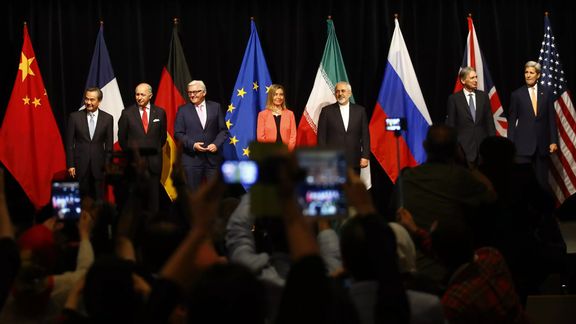
A former senior official of Iran’s Foreign Ministry and a lawmaker have warned that "infiltrators" in the upper echelons of the government pose a threat to national interests.
A former Director General for the Middle East, Mohammad Ali Sobhani, has said in an interview with Entekhab website last week that "a radical group of infiltrators are furthering measures that prevents the Iranian government from normalizing its relations with other countries."
In April 2021, former Foreign Minister Mohammad Javad Zarif had said that Russia interfered in Iran's domestic affairs particularly by dictating ideas to the top-level commanders of the revolutionary Guards (IRGC). Zarif said that Russia summoned former IRGC Qods Force commander Qassem Soleimani to Moscow on a few occasions.
Sobhani did not name any individual as an 'infiltrator,' but he stated that although he had suggested to the government the need for a team of experts to advance the negotiations to revive the 2015 nuclear deal, the government appointed Ali Bagheri-Kani as Iran's chief negotiator. He added that Bagheri did not seem to possess the right expertise and experience for the job. In the interview, Sobhani said, “I knew that he was not the right person to revive the JCPOA.”
He mentioned that due to Bagheri's performance, which yielded no tangible results, both sides came to the conclusion that the talks were not progressing effectively. Consequently, they considered the possibility of pursuing an interim agreement.
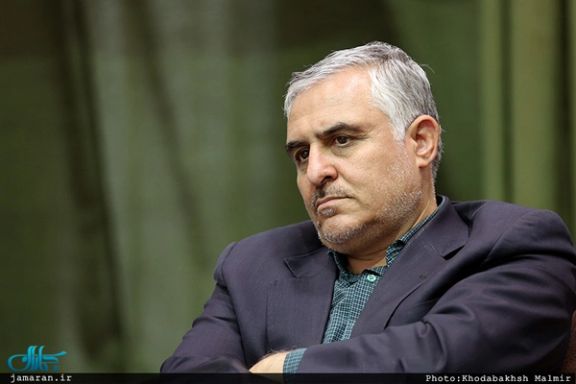
Sobhani further stated that if President Ebrahim Raisi was truly committed to serving the people of Iran, he should have promptly pursued a comprehensive agreement with the United States after assuming office in August 2021.
Sobhani remarked, “The government and its foreign minister consistently assert that Iran seeks an agreement, yet they contend that the United States does not uphold its promises. Bagheri has also reiterated that returning to the JCPOA is the only solution to the political impasse.”
He added, “However, two obstacles hinder an agreement between Iran and America. The first pertains to a radical group of potential infiltrators opposing the normalization of Iran's situation. The second set of obstacles involves the technicalities within the JCPOA.” If the government fails to normalize the country's situation by reaching an agreement and lifting sanctions, it will face more severe economic consequences.
The former diplomat reiterated, “I believe that Iran's main problem lies in the sanctions. These sanctions can only be lifted through international agreements, particularly with the United States.”
In a separate development, conservative lawmaker Ehsan Arkani stated in an interview with the Etemad Online website on Thursday that “a deviant current has infiltrated the government, the parliament, and the country's management system.”
Referring to a recent conflict between the parliament and the Interior Ministry, Arkani noted that “the influence of the deviant current extends beyond the Interior Ministry and has spread throughout a significant portion of the government, the parliament, and the country's administrative system.”
Attributing a significant portion of the country's problems to President Raisi's government, he highlighted a 50-percent inflation rate wreaking havoc, a standstill in agriculture and animal husbandry, a major water shortage, and unpaid teachers and pensioners. Arkani reminded that around 220 lawmakers had called on Raisi to run for the presidency in 2021.
He added that while the government is incapable of resolving these issues, it feigns disputes with the parliament to divert attention. Arkani reiterated, “A deviant group within the government is tarnishing the reputation of the parliament and its members while striving to ensure that the upcoming parliament's members will represent the government rather than the nation."
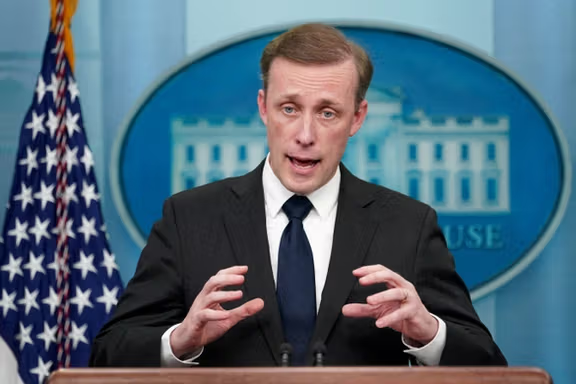
An understanding with Iran to eventually release five Americans remains on track, White House National Security Adviser Jake Sullivan said Tuesday but declined to offer any timeline.
Iran on August 10 released four imprisoned US citizens into house arrest, where they joined a fifth already under home confinement, in the first step of a deal under which $6 billion in Iranian funds in South Korea would be unfrozen and the five would eventually be allowed to leave.
"We believe that things are proceeding according to the understanding that we've reached with Iran. I don't have an exact timetable for you because there's steps that need to yet unfold. But we believe that that remains on track," Sullivan told reporters in a conference call.
South Korean media reported Monday the money has already been transferred to the Swiss central bank that would convert the funds to euros and send it to Iranian bank accounts in Qatar. Iran’s foreign ministry said Monday that it would take two months for the hostages to be allowed to leave.
Allowing the five to leave Iran, which could take weeks, would remove a major irritant between Washington and Tehran, which remain at odds on issues from the Iranian nuclear program to Tehran's support for regional Shi'ite militias.
The Iranian Americans who were allowed to leave Iran's Evin prison included businessmen Siamak Namazi, 51, and Emad Shargi, 58, as well as environmentalist Morad Tahbaz, 67, who also has British nationality. The identity of the fourth US citizen who left the prison has not been made public, nor has that of the fifth who was already under house arrest.






